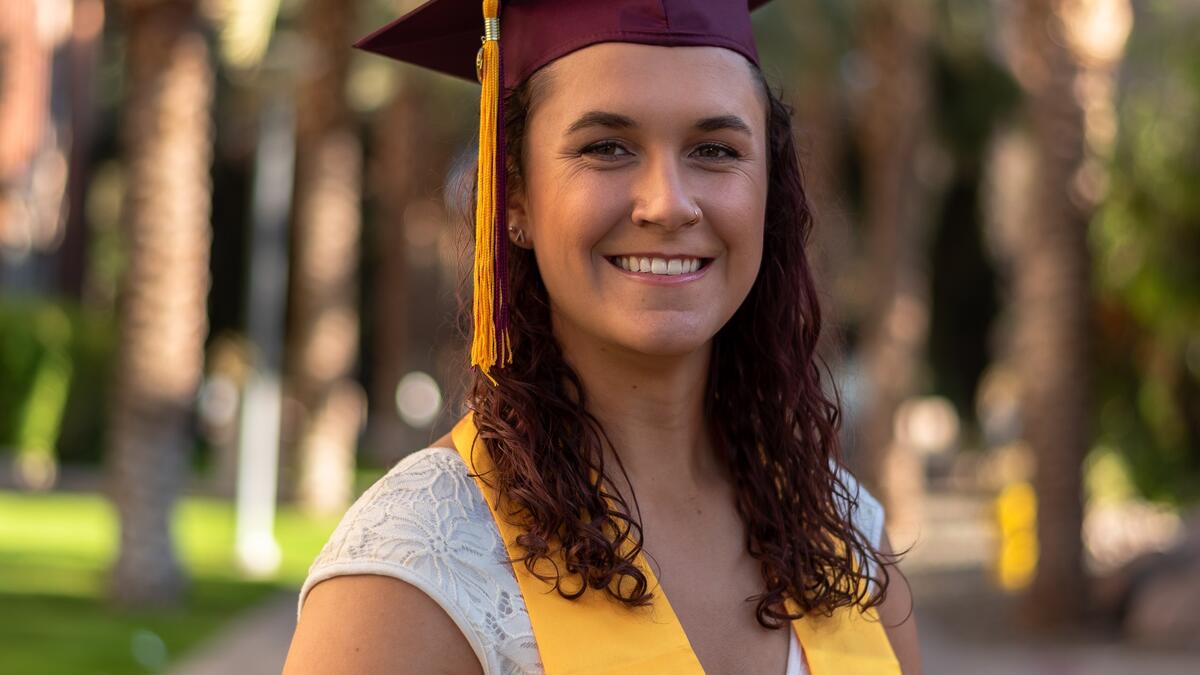ASU graduate discovers her own degree path through double majors

Victoria Froh.
Editor's note: This story is part of a series of profiles of notable spring 2021 graduates.
Victoria Froh will graduate this May with a double major in astrobiology and biogeosciences and chemistry (environmental) from ASU’s School of Earth and Space Exploration and School of Molecular Sciences in The College of Liberal Arts and Sciences and at Barrett, The Honors College.
Froh chose ASU after discovering the School of Earth and Space Exploration and the amazing research opportunities the school had to offer. She was awarded the New American University Scholarship and the Grady and Kathryn Gammage Memorial Scholarship. The beautiful Arizona scenery and the warm weather, compared to her home in Waukesha, Wisconsin, were enough to seal the deal!
Froh approached college with the mindset that the “normal path” was to choose a single major and finish in four years, but her experiences at ASU proved otherwise.
“Some people take less or more time to finish their degrees, switch their majors five times to find the right fit for them, or have a generic major but add on a lot of cool minors so they can study what they are passionate about,” said Froh. “There is no normal way to do college, and the most important thing is to make sure you are studying what you really care about and what makes you excited to learn and go to work!”
Froh’s mineralogy professor, Thomas Sharp, taught her “that if you aren't having fun with what you are doing (and teaching), it might not be the right fit for you.”
“If I can enjoy my future career as much as he enjoyed teaching us a class as hard as mineralogy, and having as much fun as we had taking the class with him, I would be happy,” said Froh.
After graduation, Froh will take some much deserved “homework-free” time off and apply to graduate school in the fall next year.
Froh answered some questions about her time here at Arizona State University.
Question: What was your “aha” moment when you realized you wanted to study the field you majored in?
Answer: I came into ASU as a general earth and space exploration major not knowing exactly what I wanted to study, and I added on the general chemistry major in my second semester. I felt kind of lost with where I wanted to take my academic career. Midway through junior year, after really feeling like I was going through the motions with some of my required classes, I realized that both the astrobiology and biogeosciences concentration in SESE and the environmental concentration for chemistry featured all of the electives I had been thinking about taking if only my schedule had room. I switched both my majors over and have been so happy with all of the cool Earth- and environmental-focused classes I have gotten to take since.
Q: What’s the best piece of advice you’d give to those still in school?
A: The most important thing is that it is OK to feel like you have no idea what is going on or what you want to do. Everyone feels a little lost in college, whether it is due to a particularly challenging class, difficulty finding an internship or job they want to do, or realizing you don't like your major. It is perfectly fine to have your interests switch (and even multiple times)! Find what you are most passionate about, and keep on working towards it.
Q: What was your favorite spot on campus, whether for studying, meeting friends or just thinking about life?
A: I have studied in a huge range of places on campus, some of my favorites being the study rooms in Noble, the Moeur building and the Design Library. However, I have to give my favorite spot to the Sports Club's Trainers Room in the Sun Devil Fitness Complex (and its inhabitants Jacob and Margaret) for continually fixing my body through three years of playing rugby, always making me feel better, and talking through all of my life's problems with me.
Q: If someone gave you $40 million to solve one problem on our planet, what would you tackle?
A: Easy — climate change and global warming. Before we fix any of the other numerous worldwide problems, we need to make sure we have a healthy and happy planet to live on.
More Science and technology

4 ASU researchers named senior members of the National Academy of Inventors
The National Academy of Inventors recently named four Arizona State University researchers as senior members to the prestigious…

Transforming Arizona’s highways for a smoother drive
Imagine you’re driving down a smooth stretch of road. Your tires have firm traction. There are no potholes you need to swerve to…

The Sun Devil who revolutionized kitty litter
If you have a cat, there’s a good chance you’re benefiting from the work of an Arizona State University alumna. In honor of…

